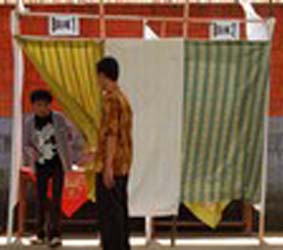Indonesia votes amid concerns over logistics, voter lists
 Jakarta/Jayapura, Indonesia - Indonesians went to the polls Thursday for parliamentary elections amid concerns of logistical problems and alleged widespread fraudulent voter lists.
Jakarta/Jayapura, Indonesia - Indonesians went to the polls Thursday for parliamentary elections amid concerns of logistical problems and alleged widespread fraudulent voter lists.
Voting began at 7 am (2200 GMT Wednesday) in Indonesia's easternmost province of Papua in the sprawling archipelago nation of more than 17,000 islands spanning three time zones.
Hours before polls opened, violence hit Papua, home to a low-level separatist insurgency, leaving one person dead, Papuan police chief Bagus Eko Danto said.
Dozens of people armed with sickles, arrows and petrol bombs attacked police stations on the outskirts of the region's main town, Jayapura, causing police to open fire, killing one person, he said.
The police chief denied reports that six people were killed in the attacks.
More than 171 million of Indonesia's more than 230 million people were eligible to vote in Thursday's polls, the third general election since the 1998 downfall of autocrat Suharto, which ushered in an era of democratic reform.
At stake are 18,560 seats in national, provincial and district parliaments and 132 seats on the regional representatives council.
Thirty-eight political parties are contesting the polls, and six parties are fighting for seats in provincial and district councils in Aceh province.
The results from the polls will determine who can field a presidential candidate in a July election. A run-off would be held in September if no ticket wins a clear majority in that vote's first round.
An official tally from Thursday's voting would not be issued for a month, but results from so-called quick counts conducted by survey institutions based on samples of votes from polling stations were expected late Thursday.
Quick counts have been accurate in predicting winners of past elections.
Surveys indicated that President Susilo Bambang Yudhoyono's Democratic Party would win the most votes at more than 20 per cent.
Yudhoyono himself is a hands-on favourite to win the presidential election with his popularity rating above 60 per cent.
Indonesia's General Elections Commission has come under fire for failing to handle the logistics better in the complicated polling process.
Observers cited serious problems, including slow delivery of ballot papers and troubled voter lists, and there were concerns the ballot sheet is so large that voters might be confused.
As part of electoral reforms, voters for the first time have to tick on the ballot paper the party or the candidate of their choice, or both.
Under the age-old elections system, voters punched a hole on the symbol of the party of their choice, and it was the party who nominated legislative candidates.
"I voted only the party," said Rokayah, 62, who cast her ballot at a polling station in central Jakarta. "I didn't choose any of the candidates because there are too many. I was confused and afraid I would make a mistake."
Rokayah, who like many Indonesians uses only one name, said she voted for the Democratic Party.
Yudhoyono expressed optimism that the legislative elections would run without trouble, citing the smooth preparations ahead of the polling day.
Yudhoyono's government has been credited with stabilizing the economy, improving security after a spate of deadly bombings blamed on Islamic militants and an aggressive campaign against corruption, seen as endemic as a result of Suharto's iron-fisted rule.
While acknowledging that the polls might need to be postponed in some remote areas of the archipelago, the election commission insisted the vast majority of around 530,000 polling stations nationwide were ready for voters four days ahead of election day. (dpa)